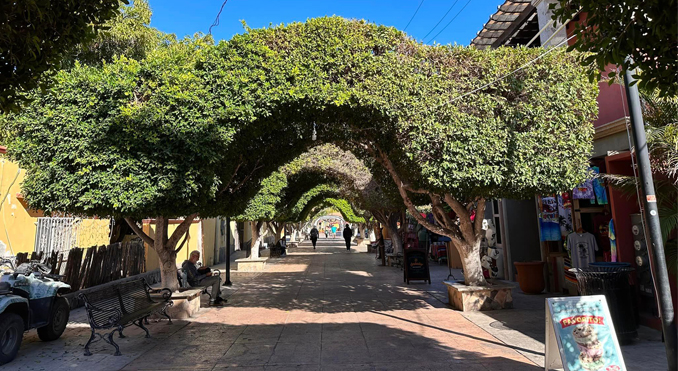
Celebrating Loreto: A Jewel in Mexico’s Crown
Spanning from the southern borders of the United States, Baja California is the world’s second-longest peninsula, sandwiched between the Pacific Ocean on its western flank and the Gulf of California to the east. Our journey aboard the ms Volendam, part of a 12-day voyage through the historical landmarks of the Baja Peninsula and the Sea of Cortez, marked the second chapter of our Hawaii/Mexico cruise. Departing from San Diego, we embarked on an adventure guided by Holland America Line, which prides itself on showcasing new, historic ports accessible only to smaller vessels. hollandamerica.com
Our ship’s captain, Ryan Whitaker, who joined us on December 10th, is a dignified and strikingly handsome young man who found love amidst the serene waters of French Polynesia. The itinerary promised us a taste of various port cities, including Cabo San Lucas, La Paz, Loreto, Guaymas, Topolobampo, Mazatlan, and Puerto Vallarta. While I have previously covered Cabo and Puerto Vallarta, revisiting these vibrant destinations is always a thrill, particularly Puerto Vallarta. This time, however, I am excited to spotlight the quaint town of Loreto, a hidden gem renowned for its historical significance and a warm winter haven that remains largely off the beaten path.
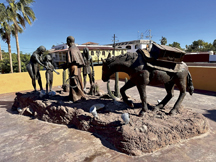 Loreto, tucked away right on the Gulf of California, is often referred to as one of the nation’s most closely guarded secrets. Although its fame has gradually increased, the city retains a quaint ambiance, with thriving local customs, and a peaceful allure. There is a rich tapestry of traditions, heritage, and stunning natural landscapes, which beckon visitors worldwide to Loreto, particularly those escaping the cold from the United States and Canada. In recognition of its “Pueblos Mágicos” status, a distinction awarded by Mexico’s Tourism Board, Loreto promises a “magical” experience characterized by its natural splendor, historical importance, cultural wealth, traditions, cuisine, artisanship, and exceptional hospitality.
Loreto, tucked away right on the Gulf of California, is often referred to as one of the nation’s most closely guarded secrets. Although its fame has gradually increased, the city retains a quaint ambiance, with thriving local customs, and a peaceful allure. There is a rich tapestry of traditions, heritage, and stunning natural landscapes, which beckon visitors worldwide to Loreto, particularly those escaping the cold from the United States and Canada. In recognition of its “Pueblos Mágicos” status, a distinction awarded by Mexico’s Tourism Board, Loreto promises a “magical” experience characterized by its natural splendor, historical importance, cultural wealth, traditions, cuisine, artisanship, and exceptional hospitality.
Anticipating an early start at 8:30 am for our bus tour, we arranged for room service breakfast the evening prior. At 6:00 am, a gentle knock on our cabin door signaled the arrival of a hearty American breakfast, complete with a toasted bagel with lox, steaming tea, and coffee. Opting for room service on port days is our preferred way to commence the day, bypassing the typical wake-up call, and the service on Holland America Line is noteworthy for its quality and punctuality. Simply placing one’s breakfast request outside the cabin door before midnight ensures a perfect start to the day.
 We convened with our tour group on the Grand Stage at around 8:00 am and promptly transferred to a tender that swiftly took us to the pier. Welcomed by traditional musicians and vibrant local dancers, our excursion began on a high note. Our guide led us onto a bus that climbed 4,000 feet into the mountains towards the Jesuit San Javier Mission. Established in 1699 by a Spanish Jesuit, San Javier is lauded as one of the most exquisite and best-preserved missions in the Californias. The journey offered breathtaking panoramas at each mountain pass.
We convened with our tour group on the Grand Stage at around 8:00 am and promptly transferred to a tender that swiftly took us to the pier. Welcomed by traditional musicians and vibrant local dancers, our excursion began on a high note. Our guide led us onto a bus that climbed 4,000 feet into the mountains towards the Jesuit San Javier Mission. Established in 1699 by a Spanish Jesuit, San Javier is lauded as one of the most exquisite and best-preserved missions in the Californias. The journey offered breathtaking panoramas at each mountain pass.
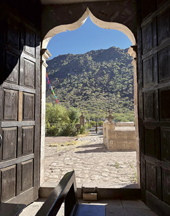
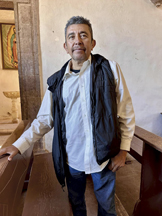 Upon reaching a small community nestled amongst the mountains, we were greeted by a couple of amicable residents living in harmony within their secluded enclave. The mission’s church, crafted from quarry stone from the Santo Domingo brook, stands as a testament to its original baroque splendor. Its resilience through centuries and numerous earthquakes is nothing short of miraculous.
Upon reaching a small community nestled amongst the mountains, we were greeted by a couple of amicable residents living in harmony within their secluded enclave. The mission’s church, crafted from quarry stone from the Santo Domingo brook, stands as a testament to its original baroque splendor. Its resilience through centuries and numerous earthquakes is nothing short of miraculous.
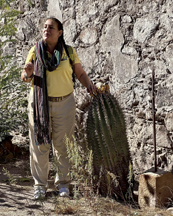 Our guide escorted us through the mission grounds, pointing out the fertile land cultivated by locals and the oldest olive tree in the Americas, over 300 years old. The profound sense of history was palpable as we stepped inside the ancient mission and came face-to-face with the benevolent gaze of the caretaker, a feeling that intensified upon touching the venerable olive tree. After exploring the site, we dined at the Palapa San Javier restaurant, enjoying simple yet delectable fare, surrounded by the rustic charm of other small outdoor cafés, a police station, and residents’ homes, all animated by roaming chickens, playful children, and the gentle rock of elders on their porches.
Our guide escorted us through the mission grounds, pointing out the fertile land cultivated by locals and the oldest olive tree in the Americas, over 300 years old. The profound sense of history was palpable as we stepped inside the ancient mission and came face-to-face with the benevolent gaze of the caretaker, a feeling that intensified upon touching the venerable olive tree. After exploring the site, we dined at the Palapa San Javier restaurant, enjoying simple yet delectable fare, surrounded by the rustic charm of other small outdoor cafés, a police station, and residents’ homes, all animated by roaming chickens, playful children, and the gentle rock of elders on their porches.
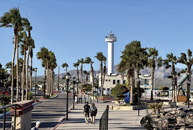
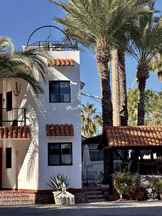 The return trip to Loreto included a stop at an awe-inspiring viewpoint, offering a glimpse of the historic path once traversed by Jesuit donkey carts. The word ‘fascinating’ scarcely does justice to the experience.
The return trip to Loreto included a stop at an awe-inspiring viewpoint, offering a glimpse of the historic path once traversed by Jesuit donkey carts. The word ‘fascinating’ scarcely does justice to the experience.
Our final stop was the Mission De Nuestra Senora De Loreto Concho, erected in 1744 and standing as a proud historical marker in downtown Loreto. 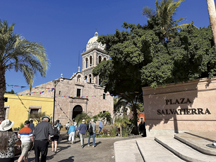 Founded by Jesuit priest Juan María Salvatierra in 1697, it was the first of 17 Jesuit missions in Baja and remained a central hub for missionary activities even after the Jesuits’ expulsion.
Founded by Jesuit priest Juan María Salvatierra in 1697, it was the first of 17 Jesuit missions in Baja and remained a central hub for missionary activities even after the Jesuits’ expulsion.
Despite its desert setting, Loreto’s agreeable winter climate, rich fishing, and array of ocean activities make it a favored tourist destination, boasting low crime rates. Notably, Loreto is the only “Pueblo Mágico” with its airport, allowing for international access. On our way back to the ship, we paused for coffee at one of the delightful local cafés and chanced upon an American retiree who spends his winters in Loreto, savoring the town’s serene lifestyle. It was a surprising encounter to end our amazing day. visitloreto.info
Until next month from another interesting location.
— Yours in travel, Ingrid
Escape From Paradise: www.EscapeFromParadise.net
www.facebook.com/ingrid.lemme #EscapeFromParadise
Award-winning TV Host, Publisher, Travel Writer.
Ambassador for www.Seven-Stars.com & 15 Emmy awards www.aTasteofHistory.org
www.twitter.com/LemmeEscape www.instagram.com/ingridlemme

